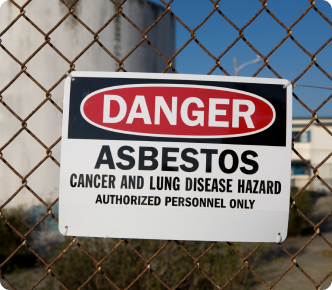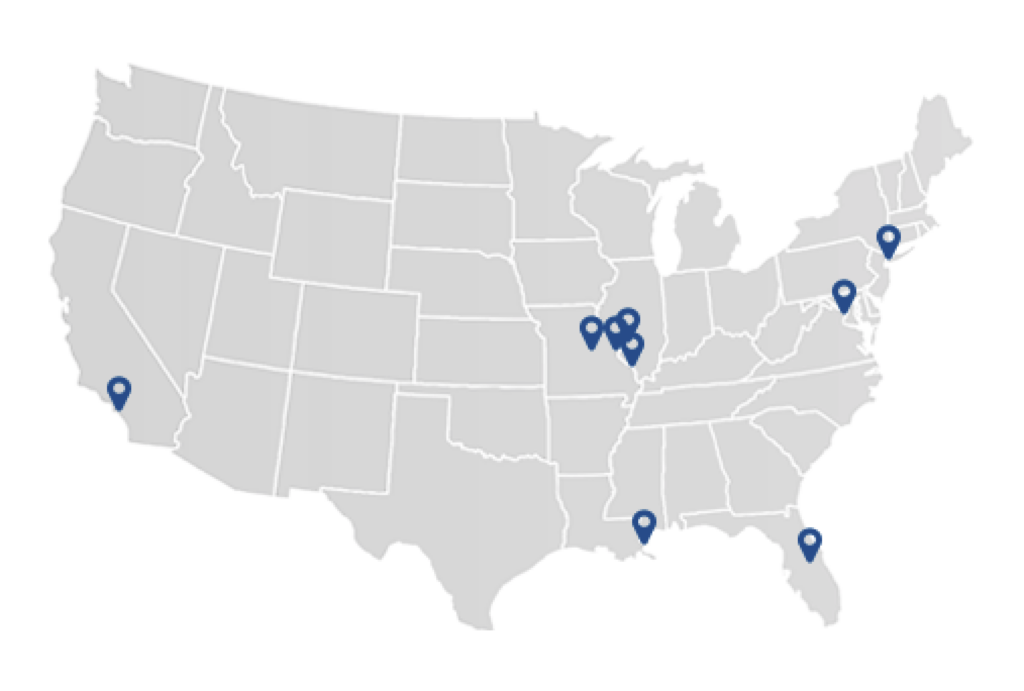Award Winning Nationwide Asbestos Exposure Law Firm
Over the past century, millions of people were exposed to asbestos. Many of them developed mesothelioma, an aggressive and often life-threatening form of cancer. Asbestos manufacturers were aware of this risk but continued to use it in everyday products and construction materials. The asbestos exposure lawyers at The Gori Law Firm help victims fight for justice and compensation from companies that chose to ignore the dangerous health effects of asbestos, including mesothelioma, asbestosis, and lung cancer.
- Asbestos was a commonly used material in various products, having caused millions of people to develop diseases like Mesothelioma. Despite being aware of the risks, manufacturers ignored them.
- Prolonged asbestos exposure is linked to Mesothelioma, a rare and deadly cancer.
- Despite reduced use and regulations in the U.S., asbestos still poses risks, especially in certain occupations.
- Those with asbestos-related illnesses can seek compensation through Mesothelioma Lawsuits and Asbestos Trust Funds.
Asbestos Exposure Information
For decades, asbestos was the go-to choice for insulation and fire-retardant construction materials. Its heat resistance and relatively low cost made it an ideal solution for manufacturers. It was only after multiple studies confirmed its dangers that asbestos use began to decline.
Follow these links to learn more about asbestos exposure and its effects:
Contact Us Today
Get your free case review 24 hours a day.
Fields marked with an * are required
Asbestos Use Through History
For decades, manufacturers used asbestos in a wide range of consumer and industrial products. Valuing its durability and abundant supply, many different industries relied on asbestos as a primary material in their products.
Although the public was initially unaware of the negative effects of asbestos, manufacturers learned of the dangers decades before they took action. Companies chose to ignore or contradict the information they received because they preferred raking in profits from this in-demand and inexpensive material.
After significant pushback from the public and the scientific community, businesses finally relented and limited their use of asbestos. Some people assume this means exposure is no longer a risk, but that’s not the case. While there are no active asbestos mines in the United States, exposure remains an ongoing problem.
There are still many products containing asbestos available on the market. According to the Environmental Protection Agency, some items that might still contain asbestos include:
- Insulation
- Roofing and siding shingles
- Vinyl floor tiles
- Heat-resistant clothing
- Brake pads
Asbestos-related diseases affect people all over the globe, but they’re particularly common in certain industries and among military personnel. Some people have even developed asbestos-related illnesses due to secondary exposure. In many of those cases, family members brought asbestos fibers home from work on their clothing, unknowingly exposing their loved ones to the life-threatening material.
Not everyone who comes into contact with asbestos becomes ill, but the risk is high. While the exact number of people exposed to asbestos in the United States is unknown, experts estimate that as many as 27 million workers were exposed from 1940 to 1979. Exposure declined in the following years as government agencies and manufacturers responded to public backlash and turned to alternate materials.
Asbestos Exposure and Mesothelioma Litigation
Even after scientists came forward with proof of the threat posed by asbestos exposure, some companies went to great lengths to conceal that information. According to historical documents, manufacturers learned about the dangers of asbestos as early as the 1930s. Their desire for easy profits compelled them to ignore the mounting evidence and silence the scientific community.
Asbestos and mesothelioma victims who became sick because of these harmful behaviors now have to carry the physical, emotional, and financial burdens of their diagnosis. However, with the support of a knowledgeable mesothelioma attorney, they can gain access to vital financial compensation.
Contact Us Today for a Free Mesothelioma Case Review.
Asbestos Trust Funds
When people discovered that manufacturers had knowingly put their health at risk, a massive wave of mesothelioma cases and lawsuits emerged. Many asbestos companies went bankrupt as a result and were forced to create mesothelioma trust funds to compensate current and future victims.
These asbestos trust funds contain a limited amount of money that is allocated specifically to people who have suffered from asbestos exposure. Victims can file an asbestos trust fund claim and request a payout. The amount of money they receive depends on their prognosis, the extent of their treatment, their age, and the amount of funds remaining in the trust.

Mesothelioma Lawsuits
In addition to filing a trust fund claim, asbestos victims can also pursue mesothelioma lawsuits. The cases are often based on product liability, an area of law designed to protect vulnerable consumers from dangerous products. Among other things, you may be able to seek compensation for things like:
- Medical expenses
- Lost wages
- Lowered earning capacity
- Pain and suffering
- Emotional distress
- Lowered quality of life
While filing a lawsuit can alleviate the financial impact of your diagnosis and medical treatment, asbestos litigation can be complex and time-consuming. A skilled asbestos exposure lawyer can help you calculate your damages, negotiate with the responsible party, and file the necessary paperwork.
An attorney from our asbestos law firm can also ensure that you comply with the statute of limitations governing your lawsuit, which sets the deadline for filing your claim. The specific time frame will vary based on where you file your claim, but most states allow between two and six years from your diagnosis.
Asbestos Exposure Lawsuit Settlements and Verdicts
Mesothelioma
Age 73 – Insulator
Mesothelioma
Age 76 – Carpenter
Mesothelioma
Age 70 – Carpenter
Mesothelioma
Age 58 – Glass Worker
Mesothelioma
Age 67 – Spouse – Inspector
Mesothelioma
Age 59 – Living – Father – Inspector
Mesothelioma
Age 72 – Plumber/Steamfitter
Mesothelioma
Age 63 – Field Engineer
Mesothelioma
Age 60 – Plumber
Mesothelioma
Age 81 – Living – Mechanic
Mesothelioma
Age 55 – Laborer
Asbestos Exposure Today
Many countries banned the use of asbestos after learning about the associated health risks, so when was asbestos banned in the United States? Unfortunately, the United States has stopped short of instituting a full-fledged ban, the government has several regulations in place to significantly reduce the risk of exposure. The Environmental Protection Agency also proposed a ban on ongoing use in 2022.
While asbestos products are not as commonplace as they once were, asbestos still poses a serious threat to some people. Learn more about occupations with an increased risk of asbestos exposure.
The Gori Law Firm: Skilled Asbestos Exposure Lawyers
The attorneys at The Gori Law Firm have more than two decades of experience litigating mesothelioma claims. As a national mesothelioma law firm, we do whatever it takes to support victims of asbestos exposure, including:
- Providing free case reviews to people with asbestos claims
- Meeting you wherever you are to discuss your case if you cannot travel to us
- Providing regular updates and remaining available to answer your questions throughout the life of your case
- Managing every aspect of your claim, including gathering evidence, negotiating settlements, and arguing your case in court
Mesothelioma victims deserve justice and accountability from asbestos companies responsible for the harm they caused. Schedule your free case review to learn how The Gori Law Firm can help with your claim.
Asbestos & Mesothelioma FAQs
How Much Asbestos Exposure Causes Mesothelioma?
Even a small amount of asbestos exposure can result in mesothelioma, asbestosis, or lung cancer. However, studies show that prolonged or repeated exposure significantly increases your chances of developing an asbestos-related disease.
What Are the Symptoms of Asbestos Exposure?
Most people aren’t aware they’ve been exposed to asbestos until they become sick, normally decades after the initial incident. Symptoms of mesothelioma include shortness of breath, dry coughs, chest tightness or pain, and problems swallowing.
Can I Sue for Asbestos Exposure?
Yes, you can sue for asbestos exposure if it harms your health. If you are suffering the health consequences of asbestos exposure, do not wait to take legal action.
How Much Does It Cost To Hire an Asbestos Exposure Attorney?
Our asbestos law firm works on a contingency basis. That means you pay nothing unless we win your case. After your claim is successfully resolved, our fees are calculated as a set percentage of your compensation. We also offer free, no-obligation consultations.
What Is the Average Settlement for an Asbestos Exposure Claim?
The size of an asbestos exposure settlement depends on the specific details of your claim and the severity of your condition. However, it’s not unusual for mesothelioma victims to receive millions of dollars as compensation for the serious damage their asbestos exposure caused to their long-term health.
Related Reading
View Sources
“Asbestos Toxicity: Who Is at Risk of Exposure to Asbestos? | Environmental Medicine | ATSDR.”
Www.atsdr.cdc.gov, 9 Feb. 2021, www.atsdr.cdc.gov/csem/asbestos/who_is_at_risk.html. Accessed 9 Jan. 2024.
“How Georgia-Pacific Knowingly Published Fake Science on the Safety of Asbestos.”
Union of Concerned Scientists, 2017, www.ucsusa.org/resources/how-georgia-pacific-knowingly-published-fake-science-safety-asbestos. Accessed 9 Jan. 2024.
“Veterans Asbestos Exposure.”
Veterans Affairs, 18 July 2023, www.va.gov/disability/eligibility/hazardous-materials-exposure/asbestos/. Accessed 9 Jan. 2024.


